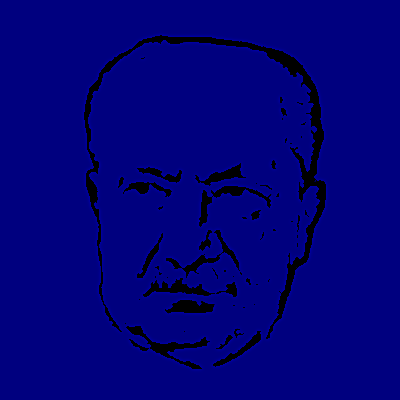A contemplation of Machination conceived by Heidegger, as the destiny of a historically consummated transfiguration of the being's Being in the figure of Nihilism
Main Article Content
Abstract
Here is an interpretation of Heidegger's explanation of the fundamentals and developments of the phenomenon of Nihilism, proceeded by the fixation of the meaning of Being as Machination. This interpretation implies the presentation of the Philosopher's preparatory steps for a writing about the meaning of Being guided by another Principle than that instituted by Metaphysics, and it is made from the contemplation of two exemplary texts by Heidegger, in which he investigates the metaphysical determination of Being in two capital periods of the history of Thought: the classical period of Greek Metaphysics, notably in Aristotle, and the consummate period of modern Metaphysics, aimed at through Nietzsche's Philosophy
Downloads
Article Details

This work is licensed under a Creative Commons Attribution-NonCommercial-NoDerivatives 4.0 International License.
Authors retain ownership of copyright and reproduction rights.
Authors may make other independent and additional contractual arrangements for non-exclusive distribution of the version of the article published in this journal (e.g., inclusion in an institutional repository or publication in a book) as long as they clearly indicate that the work was first published in this journal.
Authors are allowed and encouraged to publish their work on the Internet (e.g. on institutional or personal websites) after the review and publication process, as it may lead to productive exchanges and to a wider and faster dissemination of the published work.
References
Aristóteles, Física. Tr. G. R. de Echandía. Madrid: Gredos, 1995.
Giacóia, J. O. Heidegger urgente – introdução a um novo pensar. São Paulo: Três Estrelas, 2013.
Greisch. J. Ontologie et temporalité. Paris: Presses Universitaires de France, 1994.
Heidegger, M. Aus der Erfahrung des Denkens. Pfullingen, Neske, 1977.
Heidegger, M. Beiträge zur Philosophie (Vom Ereignis). GA 65. Frankfurt Am Main: Klostermann, 1989.
Heidegger, M. Besinnung. GA 66. Frankfurt Am Main: Klostermann, 1997.
Heidegger, M. "Brief an Richardson" in Heidegger - Through Phenomenology to Thought. Richardson, W. J, SJ. New York: Fordhan University Press, 2003, Vorwort, p. XI)
Heidegger, M. Der Ursprung des Kunstwerkes", in Holtzwege. GA 5. Frankfurt Am Main: Klostermann, 1977.
Heidegger, M. Die Frage nach Tecknik. in Vorträge und Aufsätze. GA 7. Frankfurt Am Main: Klostermann, 2000.
Heidegger, M. Die Geschichte des Seyns. GA 69. Frankfurt Am Main: Klostermann, 1998.
Heidegger, M. Die Grundprobleme der Phänomenologie. GA 24. Frankfurt Am Main: Klostermann, 1989.
Heidegger, M. Einführung in die Metaphysik. GA 40. Frankfurt am Main: Klostermann, 1983.
Heidegger, M. Grundbegriffe der aristotelischen Philosophie GA 18. Frankfurt Am Main: Klostermann, 1992, 2002.
Heidegger, M. Les Séminaires du Thor", in "Heidegger- Questions III e IV" (Rédacteur Jean Beaufret). Paris: Gallimard, 1976.
Heidegger, M. Metaphisik und Nihilismus. GA 67. Frankfurt Am Main: Klostermann, 1999.
Heidegger, M. Nietzsche. GA 6.2. Frankfurt Am Main: Klostermann, 1997.
Heidegger, M. "Platons Lehre von der Wahrheit", in Wegmarken. GA 9. Frankfurt Am Main: Klostermann, 1976.
Heidegger, M. Platon: Sophistes. GA 19. Frankfurt Am Main: Klostermann, 1992.
Heidegger, M. Sein und Zeit. GA 2. Frankfurt Am Main: Klostermann, 1977.
Heidegger, M. "Vom Wesen und Begriff der Physis. Aristoteles, Physik B, 1", in Wegmarken. GA 9. Frankfurt Am Main: Klostermann, 1976.
Heidegger, M. “Wissenschaft und Besinnung”, in Vorträge und Aufsätze. Frankfurt Am Main: GA 7 Vittorio Klostermann GmbH, 2000.
Heidegger, M. "Wozu Dichter?" in Holzwege. GA 5. Frankfurt Am Main: Klostermann, 1977.
Heidegger, M. Zeit und Sein. Tübingen: Niemeyer, 1967.
Heidegger, M. Zollikoner Seminare. GA 89. Frankfurt Am Main: Klostermann, 1984.
Heidegger, M. Zur Erörterung der Gelassenheit – Aus einem Feldweggespräch über das Denken. Pfullingen: Neske, 1979.
Rosa, G. in "Diálogo com Guimarães Rosa" (Günter Lorenz). Rio de Janeiro: Nova Aguilar, 1994.
Rutigliano S., F. "Heidegger e o Diálogo: O Percurso de uma discussão fenomenológica na qual o fenômeno da serenidade é apresentado enquanto o constitutivo da essência o pensamento", Revista Portuguesa da Filosofia, Braga. 2017.

